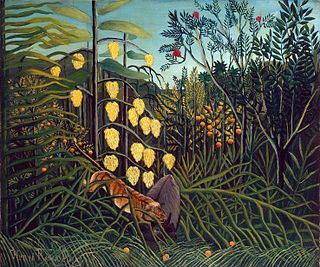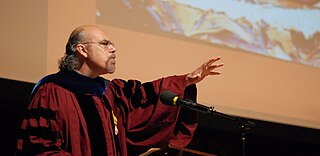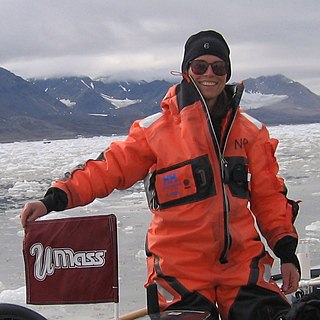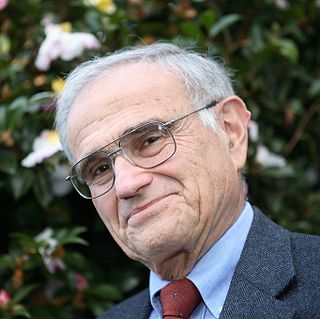Related Research Articles

John Zerzan is an American anarchist and primitivist ecophilosopher and author. His works criticize agricultural civilization as inherently oppressive, and advocates drawing upon the ways of life of hunter-gatherers as an inspiration for what a free society should look like. Subjects of his criticism include domestication, language, symbolic thought and the concept of time.

Primitivism is a mode of aesthetic idealization that either emulates or aspires to recreate "primitive" experience. It is also defined as a philosophical doctrine that considers "primitive" peoples as more noble than civilized peoples and was an offshoot of a nostalgia for a lost Eden or Golden Age.

Richard Wolin is an American intellectual historian who writes on 20th Century European philosophy, particularly German philosopher Martin Heidegger and the group of thinkers known collectively as the Frankfurt School.
Jay Ruby was an American scholar who was a professor in the Department of Anthropology at Temple University until his retirement in 2003. He received his B.A. in History (1960) and Ph.D. in Anthropology (1969) from the University of California, Los Angeles.
Paul James Connerton was a British social anthropologist best known for his work on social and body memory.
James L. Gelvin is an American scholar of Middle Eastern history. He has been a faculty member in the department of history at the University of California, Los Angeles (UCLA) since 1995 and has written extensively on the history of the modern Middle East, with particular emphasis on nationalism and the social and cultural history of the modern Middle East.
Jeffrey C. Herf is an American historian. He is Distinguished University Professor of modern European, in particular modern German, history at the University of Maryland, College Park.

Arif Dirlik was a Turkish-American historian who published on historiography and political ideology in modern China, as well as issues in modernity, globalization, and post-colonial criticism. Dirlik received a BSc in Electrical Engineering at Robert College, Istanbul in 1964 and a PhD in History at the University of Rochester in 1973.

Joel Mokyr is a Netherlands-born American-Israeli economic historian. He is a professor of economics and history at Northwestern University, where he has taught since 1974; in 1994 he was named the Robert H. Strotz Professor of Arts and Sciences. He is also a Sackler Professorial Fellow at the University of Tel Aviv's Eitan Berglas School of Economics.
Russell A. Berman is an American professor of German Studies and Comparative Literature. He is the Walter A. Haas Professor in the Humanities at Stanford University. He is also a senior fellow at the Hoover Institution. He is the director of Stanford's Thinking Matters program. He previously served as associate dean and director of Stanford's Overseas Studies Program.
Svetlana Boym was a Russian-American cultural theorist, visual and media artist, playwright and novelist. She was the Curt Hugo Reisinger Professor of Slavic and Comparative Literatures at Harvard University. She was an associate of the Graduate School of Design and Architecture at Harvard University. Much of her work focused on developing the new theoretical concept of the off-modern.

Davíd Lee Carrasco is an American academic historian of religion, anthropologist, and Mesoamericanist scholar. As of 2001 he holds the inaugural appointment as Neil L. Rudenstine Professor of Latin America Studies at the Harvard Divinity School, in a joint appointment with the Faculty of Arts and Sciences' Department of Anthropology at Harvard University. Carrasco previously taught at the University of Colorado, Boulder and Princeton University and is known for his research and publications on Mesoamerican religion and history, his public speaking as well as wider contributions within Latin American studies and Latino/a studies. He has made statements about Latino contributions to US democracy in public dialogues with Cornel West, Toni Morrison, and Samuel P. Huntington. His work is known primarily for his writings on the ways human societies orient themselves with sacred places.

Guy Beiner is an Israeli historian of the late-modern period. He is a full professor at Ben-Gurion University of the Negev in Beer Sheva, Israel. In September 2021, he was named the Sullivan Chair in Irish Studies at Boston College.
Bruce Mazlish was an American historian who was a professor in the Department of History at the Massachusetts Institute of Technology. His work focused on historiography and philosophy of history, history of science and technology, artificial intelligence, history of the social sciences, the two cultures and bridging the humanities and sciences, revolution, psychohistory, history of globalization and the history of global citizenship. He worked to build the latter two fields of inquiry into a public intellectual movement, through initiatives such as the New Global History conferences.

Thomas Albert (Tal) Howard is a Professor of History and the Humanities at Valparaiso University, Indiana. He formerly directed the Center for Faith and Inquiry and was Professor of History at Gordon College in Wenham, Massachusetts. He completed his MA (1992) and Ph.D. (1996) at the University of Virginia, concentrating in modern European intellectual and religious history. He is founding director of Gordon College's honors program, the Jerusalem and Athens Forum, a one-year, great-books course of study in the history of Christian thought and literature. He served as principal grant writer and project director of a multimillion-dollar project funded by the Lilly Endowment, entitled "Critical Loyalty: Christian Vocation at Gordon College."
Maria Bucur is an American-Romanian historian of modern Eastern Europe and gender in the twentieth century. She has written on the history of eugenics in Eastern Europe, memory and war in twentieth-century Romania, gender and modernism, and gender and citizenship. She teaches history and gender studies at Indiana University, Bloomington, where she holds the John W. Hill Professorship. Between 2011 and 2014 she served as founding Associate Dean of the School of Global and International Studies and helped inaugurate the first SGIS graduating class in 2014.
Alan C. Swedlund is a biological anthropologist and Emeritus Professor at the University of Massachusetts Amherst. Early in his career he was an assistant professor at Prescott College, Prescott, AZ. His research focuses primarily on the history of the human population, and on health and disease. He is the author of Shadows in the Valley: A cultural history of Illness, Death and Loss in New England, 1840-1916.

Julie Brigham-Grette is a glacial geologist and a professor in the Department of Geosciences at the University of Massachusetts Amherst where she co-directs the Joseph Hartshorn Quaternary Laboratory. Her research expertise is in glacial geology and paleoclimatology; she has made important contributions to Arctic marine and terrestrial paleoclimate records of late Cenozoic to recent, the evolution of the Arctic climate, especially in the Beringia/Bering Strait region, and was a leader of the international Lake El’gygytgyn Drilling Project in northeastern Russia.

Michael Albert Meyer is a German-born American historian of modern Jewish history. He taught for over 50 years at the Hebrew Union College-Jewish Institute of Religion in Cincinnati, Ohio. He is currently the Adolph S. Ochs Emeritus Professor of Jewish History at that institution. He was one of the founders of the Association for Jewish Studies, and served as its president from 1978–80. He also served as International President of the Leo Baeck Institute from 1992–2013. He has published many books and articles, most notably on the history of German Jews, the origins and history of the Reform movement in Judaism, and Jewish people and faith confronting modernity. He is a three-time National Jewish Book Award winner.
Marla Miller is an American public historian.
References
- ↑ "Department of History | University of Colorado at Boulder". Colorado.edu. Archived from the original on 2011-09-27. Retrieved 2011-07-13.
- ↑ "About TELOS". Telos Press. Retrieved 2011-07-13.
- ↑ "UMass Amherst: University of Massachusetts Press". Umass.edu. Archived from the original on 2010-05-29. Retrieved 2011-07-13.